I moved to Southern Louisiana a year ago. Where I came from, there was no real need to know how to prepare for a hurricane, though similarities do exist compared to other sorts of critical weather events.
Despite the unusually hot summer in my new home, I was grateful for the low hurricane activity. My first year here was free of extreme weather threats. Now, as hurricane season 2024 approaches, I want to be as prepared as possible for any potential dangers. Let’s face it—no one can be fully ready for such events, but we can do our best to stay prepared.
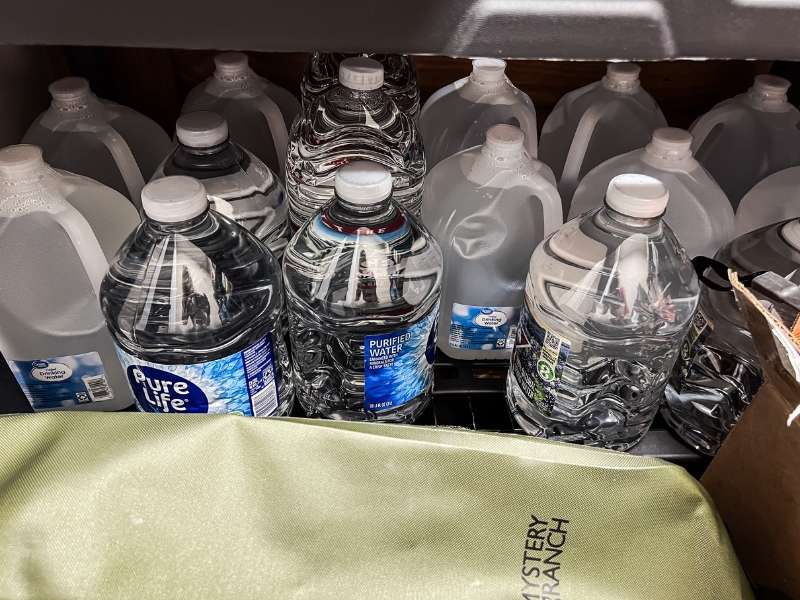
Moving to a region directly in the hurricane’s path prompted me to join a hurricane-season Facebook group. This decision has been both a blessing and a source of anxiety. On one hand, it has jumpstarted my preparedness efforts. On the other, it has kept me awake at 3 AM, reading harrowing stories of people evacuating by boat with their pets, leaving all their possessions behind. I
prefer to focus on preparedness, which suits my personality. I spent two years living full-time in my 2017 GMC Savannah Van (@Van_Solo_). That experience was a masterclass in minimalism and creativity. You learn to make supplies last longer and understand the value of good tools and gear, avoiding items that can’t withstand the rigors of such a lifestyle.
I thought I’d share my hurricane prep journey with the hope that it can help anyone new to navigating something like this.
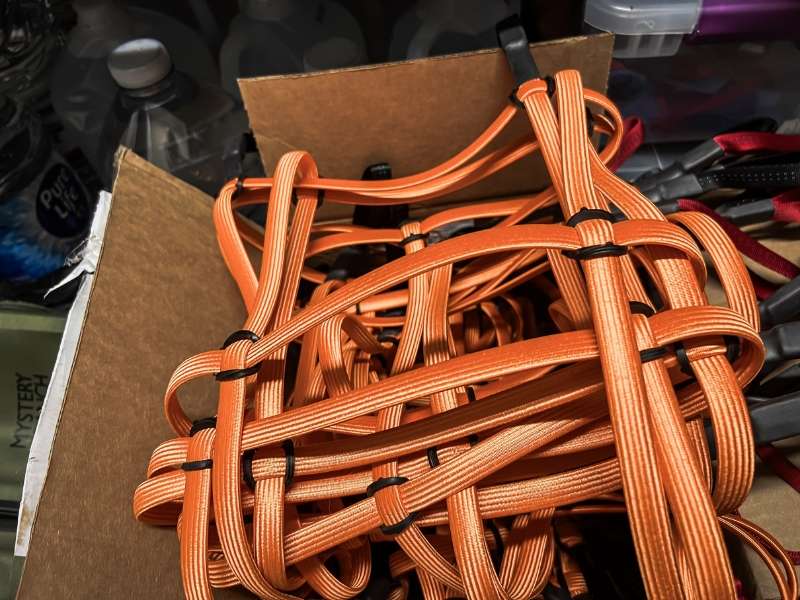
How to Prepare for a Hurricane: a Newbie’s Guide
Kicking off my hurricane prep journey.
I decided to start with an area of my home that would become my “war room” (aka Command Center). I chose a large closet and added a shelf dedicated strictly to my emergency supplies. This way, everyone knows where to go, and everything is in one location.
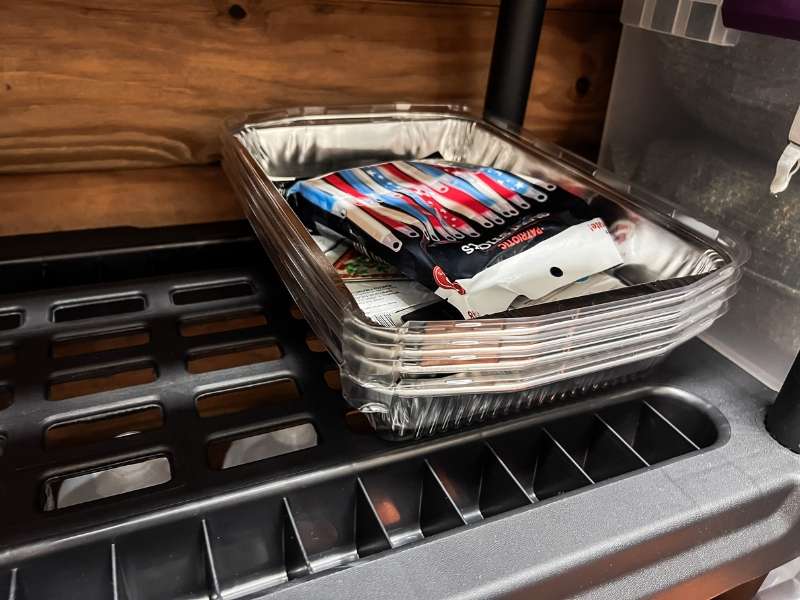
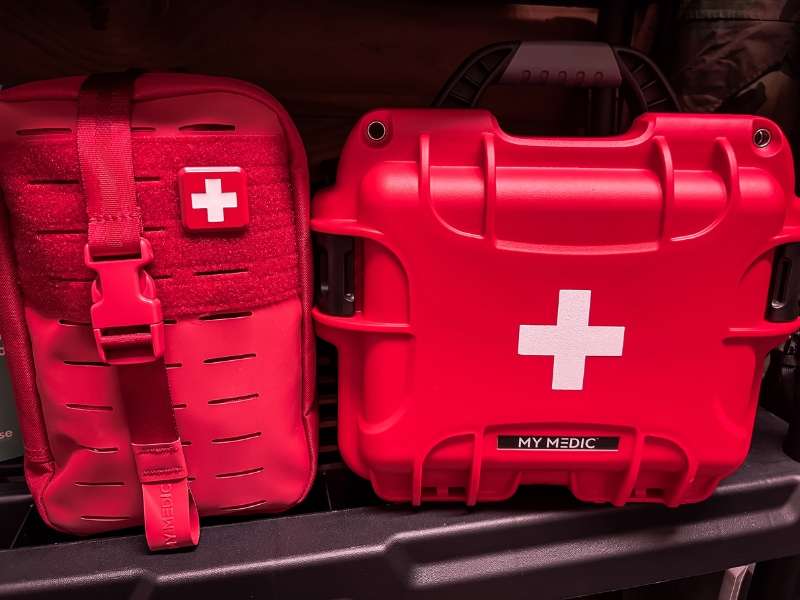
What gets added to my shelf?
I’ll break this down into two categories. The first is “The Must-Haves,” which are pretty straightforward here: Food, Water, and Shelter.
The second is “The Thoughtful Extras,” which are items that I really put some thought into, things that will simply make survival easier.
Hurricane Prep: the Must-Haves
- Water – I’m shooting for three gallons per person (including pets) for three days, I also have a life-straw water purifier. I simply just buy an extra gallon or case of water bottles when I shop and add that to my shelf inventory.
- Food – Non-perishable Items that I can easily make a meal with canned goods, rice, nuts, granola, etc.
- Pet Supplies – Extra bag of food, dishes, leashes, collars, and medications.
- Lights– A few battery-operated and solar-powered options, flashlights, lanterns, and glow sticks.
- Batteries – All sizes, in multiple quantities
- Tools – Axe for splitting wood, chainsaw (extra blades) for cutting downed trees that might be blocking roadways, a multi-tool, firestarters, matches, lighters, knives, paracord.
- Navigation – Radio, Compass, waterproof maps (in case you can’t charge your phone and use apps)😉
- Medical – MyMedic Waterproof First Aid Kits (life-saving, not boo-boo style) Jase Case– individualized prescription meds. Make sure you have at least a small amount of your Rx pre-packed (in your go-bag or whatever) or ensure redundant checkpoints in your process to ensure this isn’t forgotten.
- Power – Portable phone charger (must be fully charged, of course) Solar panels if you have them (luckily, my van provides shelter and solar power.)
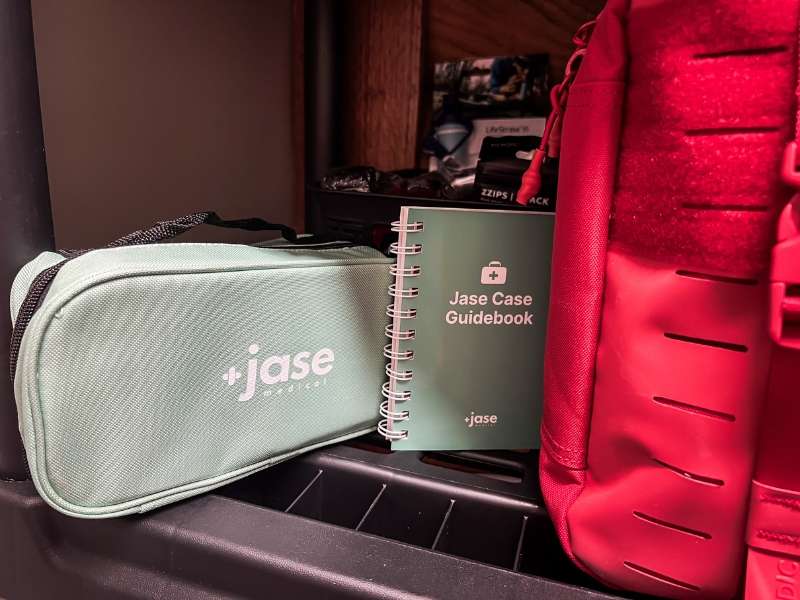
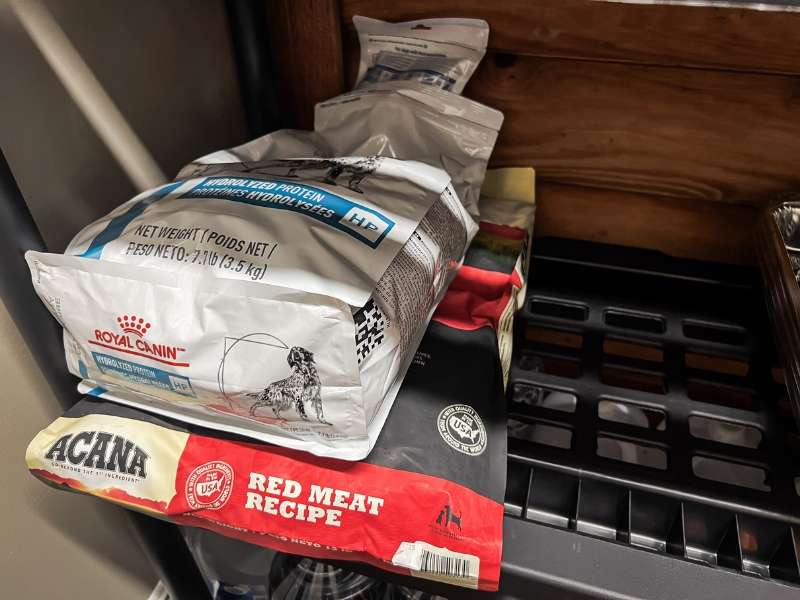
Hurricane Prep: the Thoughtful Extras
- Important Paperwork – I purchased a fireproof, water proof document safe and added all of our important documents in here, passports, birth certificates, SS cards, insurance papers, etc, I also got a lightweight container so I can grab my documents quickly in case of evacuation and bring them with us.
- Supplies – Ziplock bags, aluminum pans for cooking on a grill, aluminum foil, Mystery Ranch waterproof duffle bag to use as my “go bag” in case of evacuation, Gatorade, toilet paper, bandannas, metal water bottles, sunglasses, ammo, blankets, towels, dish soap, salt and pepper.
- Fasteners – If we need to tie anything down or strap stuff down (on top of my vehicle or boat if it gets to that), things like Finu cargo nets, zip ties, carabiners, etc.
- Personal Hygiene – Soaps, toothpaste, hand sanitizer, sunscreen, chapstick, mosquito repellant, mosquito net, sun hat, extra socks, poncho-wet weather gear, flip-flops, underwear, sun shirts, and gloves for working.
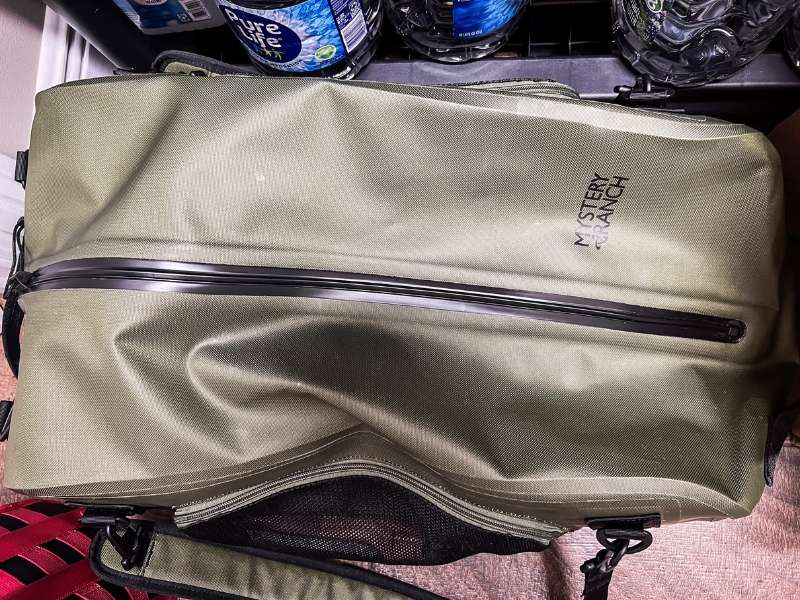
So, what about my property?
We are assessing what we need to do to reinforce windows and doors. I have a plan in place for securing outdoor items, bringing in lawn furniture, etc. I have also been checking out trees on our property and trimming what needs to come down. I have also made sure to check and clean gutters to help with water drainage.
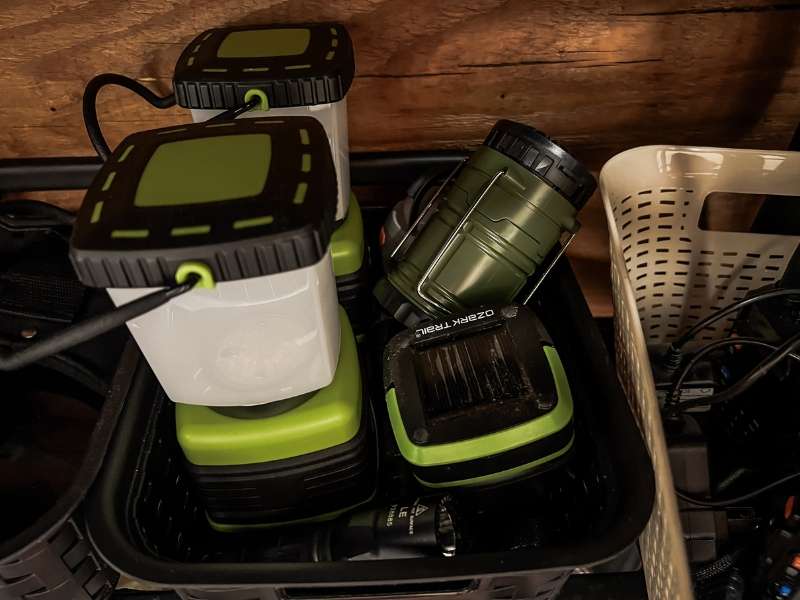
What if I have to evacuate?
An evacuation plan is crucial, especially if you live in a high-risk area like ours. Identify multiple evacuation routes and have a destination in mind. For this information, contact your local sheriff’s office or town hall. Share this plan with all family members and practice it regularly.
I keep my van full of supplies for work, so I am ready in that department and will consider leaving the area if the threat is severe.
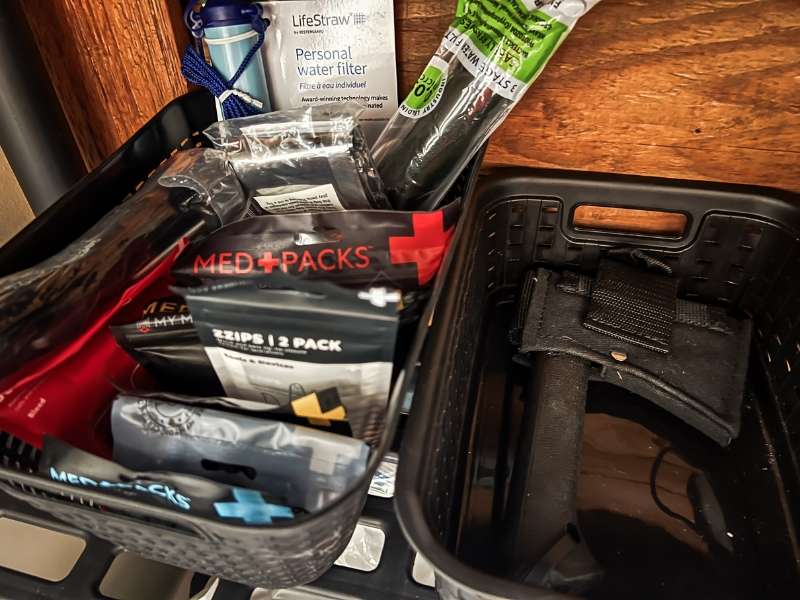
Preparing a Go-Bag
A go-bag should contain essential items such as identification documents, cash, credit cards, and important contact information. It should also include basic supplies like food, water, a first aid kit, and clothing.
Alway make sure you have your prescription medication available.
I don’t keep these items in a bag; I just keep my waterproof duffle next to my shelf so if I have to split, I can easily load what I need. My van is essentially my Go-Bag as it has solar panels, a fridge, a means to cook, a bed, and supplies.
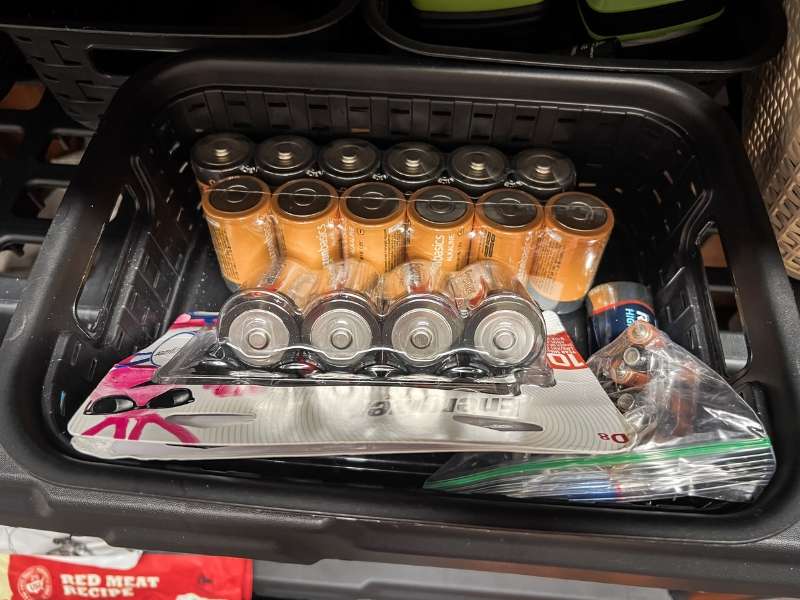
Make a Plan For Different Situations
Anything can happen during a natural disaster. One minute, you’re dealing with wind damage; the next, flooding or fire. We are building family plans to deal with multiple scenarios of an emergency, making sure everyone knows the plan.
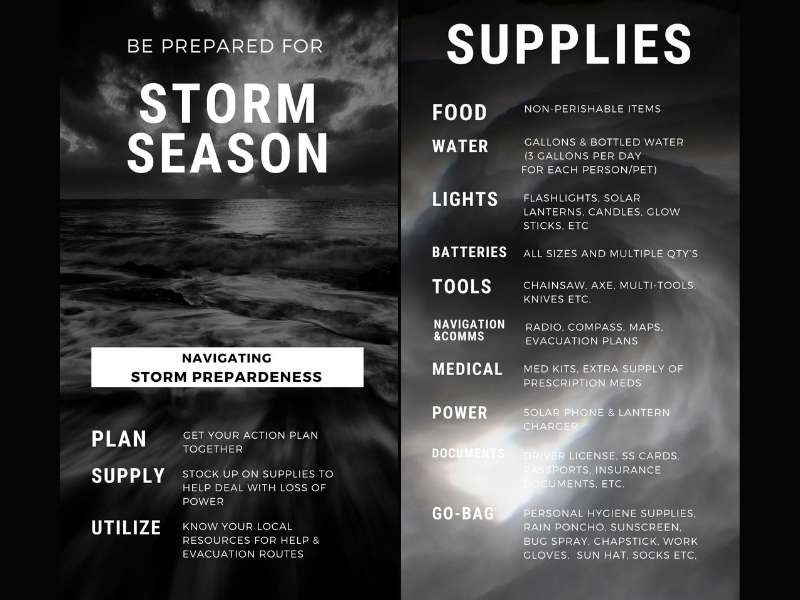
Utilize your Community Resources
Local Support Systems
Familiarize yourself with local community resources. Many towns and cities have emergency shelters, community centers, and support services available during hurricanes. Knowing where to go for help can provide peace of mind.
Be mindful of neighbors
Check on your neigbors if you have them, especially the elderly and anyone that might need a hand.
Storms Coming
Once we know a storm is coming we will fill gas tanks in all vehicles, fill up bath tubs, get propane, or extra gas cans filled, handle ATM withdrawals for cash on hand, and begin our home and property prep.
So, now I just wait?
Preparing for a hurricane involves careful planning and proactive steps to protect your home and family. By stocking up on essentials, securing your home, staying informed, and having a solid evacuation plan, you can mitigate the risks associated with hurricanes.
This is a whole new experience for me, and I hope that by sharing my journey, I can help others who are going through this for the first time.
Stay Prepared, Stay Safe!
If you have hurricane experience, roger up in the comments and share the knowledge!
Additional Resources
- Ready.gov advice for hurricane season
- Red Cross Hurricane Safety
- National Weather Service hurricane plan
- NOAA on National Hurricane Preparedness Week
- Hurricane planning on WikiHow
We work pretty hard on this stuff. Do us a solid if you’re getting anything out of our writing!


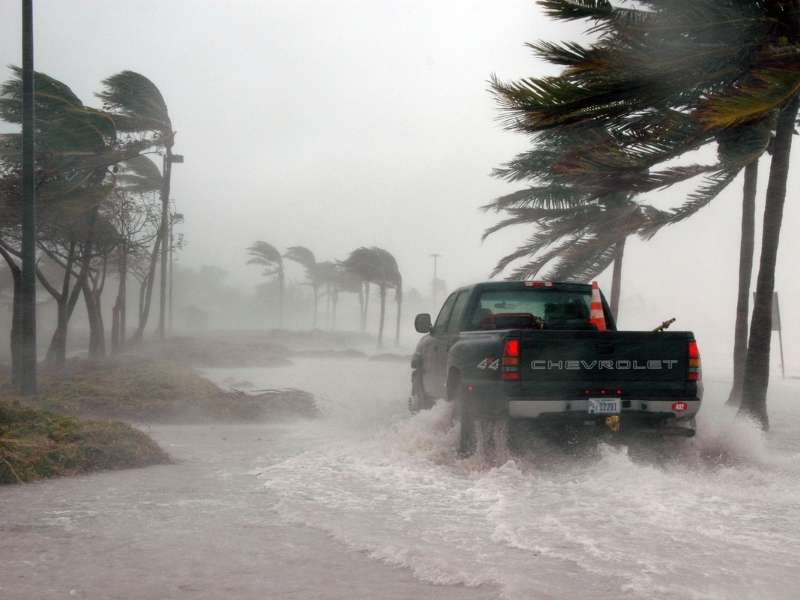






0 Comments